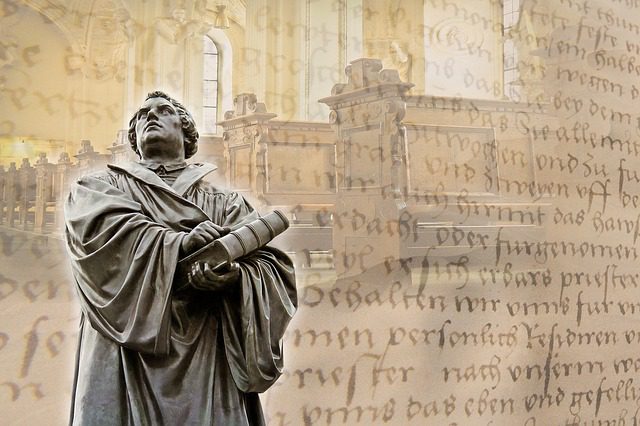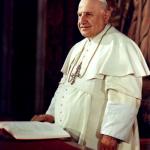
(11-10-14)
***
Merit
[L]ove grows by works of love, and man becomes better . . . (The 95 Theses, #44; 31 October 1517; translated by C. M. Jacobs, 1915)
Sin and evil inclination must be recognized as truly sin; that it does not harm us is to be ascribed to the grace of God, Who will not count it against us if only we strive against it in many trials, works, and sufferings, . . . (Treatise on Baptism, Nov. 1519; translated by C. M. Jacobs, 1915)
But they who in such suffering trust God and retain a good, firm confidence in Him, and believe that He is pleased with them, these see in their sufferings and afflictions nothing but precious merits and the rarest possessions, the value of which no one can estimate. For faith and confidence make precious before God all that which others think most shameful, . . . (Treatise on Good Works, March 1520; translated by W. A. Lambert, 1915)
[W]e cannot boast of many merits and works, if they are viewed apart from grace and mercy, but as it is written, 1 Cor. 1:31: He that glorieth, let him glory in the Lord, . . . (Smalcald Articles, 1537; Pt. III, Art. XIII; translated by W. H. T. Dau and F. Bente in 1921)
Sanctification
If you believe in Christ and in his advent, it is the highest praise and thanks to God to be holy. If you recognize, love, and magnify his grace and work in you, and cast aside and condemn self and the works of self, then are you a Christian. . . . Do you desire to be a part of the holy Christian church and communion of saints, you must also be holy as she is, yet not of yourself but through Christ alone in whom all are holy. (Sermon for the First Sunday in Advent; Matthew 21:1-9, 1521, tr. E. H. Caselmann; in Serm., v. 1)
For this life is nothing more than a life of faith, of love, and of sanctified affliction. But these three will never be perfect in us while we live here on earth, and no one possesses them in perfection except Christ. He is the sun and is set for our example, which we must imitate. For this reason there will always be found among us some that are weak, others that are strong, and again some that are stronger; these are able to suffer less, those more; and so they must all continue in the imitation of Christ. For this life is a constant progress from faith to faith, from love to love, from patience to patience, and from affliction to affliction. It is not righteousness, but justification; not purity, but purification; we have not yet arrived at our destination, but we are all on the road, and some are farther advanced than others. (A Sermon on Confession and the Lord’s Supper; 1524; in Serm., v. 2)
Christian experience . . . must feel and prove, must test and ascertain, whether one is prompted by a sincere and gracious will. He who perseveres and learns in this way will go forward in his experience, finding God’s will so gracious and pleasing he would not exchange it for all the world’s wealth. He will discover that acceptance of God’s will affords him more happiness, even in poverty, disgrace and adversity, than is the lot of any worldling in the midst of earthly honors and pleasures. He will finally arrive at a degree of perfection making him inclined to exchange life for death, and, with Paul, to desire to depart that sin may no more live in him, and that the will of God may be done perfectly in himself in every relation. In this respect he is wholly unlike the world; he conducts himself very differently from it. (Sermon for the First Sunday After Epiphany; Romans 12:1-6, 1525; in Serm., v. 7)
It is true of Christ’s kingdom that his Christians are not perfectly holy. They have begun to be holy and are in a state of progression. . . . we are in a state of progression; but during the progress much of the old and as yet untransformed nature is intermingled. (Sermon for the Fifth Sunday After Epiphany; Colossians 3:12-17, 1525; in Serm., v. 7)
. . . sanctification, deals with the work of the Holy Spirit. The people are to be taught to pray that God rule and protect us by his Holy Spirit, and are to be shown how weak we are and how miserably we fail if God does not draw us to himself and keep us through the Holy Spirit. (Instructions for the Visitors of Parish Pastors in Electoral Saxony, Jan. 1528, tr. Conrad Bergendoff; in LW, v. 40)
[A]fter death sin will have completely passed away and then the Holy Spirit will complete his work and then my sanctification will be complete. . . . the Holy Spirit will sanctify me and is sanctifying me. . . . He begins to sanctify now; when we have died, he will complete this sanctification . . . (Sermons I, ed. and tr. John W. Doberstein; Sermon on the Creed, Dec. 1528; in LW, v. 51)
[T]he Holy Ghost has called me by the Gospel, enlightened me with His gifts, sanctified and kept me in the true faith; even as He calls, gathers, enlightens, and sanctifies the whole Christian Church on earth . . . (Small Catechism, 1529; II; tr. W. H. T. Dau and F. Bente; in BC)
[B]y His grace we believe His holy Word and lead a godly life here in time and yonder in eternity. (Ibid., III)
[W]e have allowed the people to go their own merry way without amending and changing their lives. (Admonition Concerning the Sacrament of the Body and Blood of our Lord, Oct. 1530, tr. Martin E. Lehmann; in LW, v. 38)
[T]he entire man, both as to his person and his works, is to be called and to be righteous and holy from pure grace and mercy, shed upon us [unfolded] and spread over us in Christ. (Smalcald Articles, 1537; Pt. III, Art. XIII; tr. W. H. T. Dau and F. Bente; in BC)
For we need the Decalog not only because it tells us in legal fashion what we are bound to do, but also in order that we may see in it how far the Holy Ghost has brought us in His sanctifying work, and how much we still fall short, so that we may not become careless and think that we have now done all that is required. Thus we are constantly to grow in sanctification and ever to become more and more “a new creature” in Christ. . . . the Holy Ghost is here, and He sanctifies men’s hearts, and brings these fruits out of good, fine hearts, . . . (On the Councils and the Churches, March 1539; tr. C. M. Jacobs; in W5)
But life, which should daily direct, purify, and sanctify itself according to doctrine, . . . as long as it is in the process of purification and sanctification, . . . is graciously excused, pardoned, and forgiven for the sake of the word, through which it is healed and purified . . . (Against Hanswurst, April 1541, tr. Eric W. Gritsch; in LW, v. 41)
Abbreviations / Sources
BC Book of Concord (Triglot Concordia: The Symbolical Books of the Evangelical Lutheran Church: German-Latin-English (Published in 1917 by resolution of the Evangelical Lutheran Synod; St. Louis: Concordia Publishing House, 1921; translated by W. H. T. Dau and F. Bente.
LW Luther’s Works, American edition, edited by Jaroslav Pelikan (volumes 1-30) and Helmut T. Lehmann (volumes 31-55), St. Louis: Concordia Publishing House (volumes 1-30); Philadelphia: Fortress Press (volumes 31-55), starting in 1955.
Serm. Sermons of Martin Luther, The Church Postils; edited and partially translated by John Nicholas Lenker, 8 volumes. Volumes 1-5 were originally published in Minneapolis by Lutherans of All Lands, 1904-1906. Volumes 6-8 were originally published in Minneapolis by The Luther Press, 1908-1909.
W5 Works of Martin Luther, Volume V (Philadelphia: A. J. Holman Co. and The Castle Press: 1931).
***
Photo credit: image by “andibreit” (Nov. 2016) [Pixabay / CC0 Creative Commons license]
***













